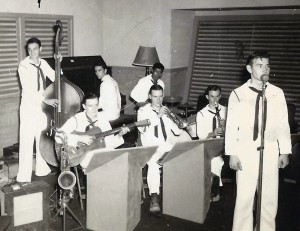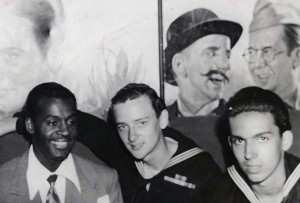In addition to recording my father Frank’s original compositions from his room in the nursing home (using a midi keyboard and bringing the files back to my studio), I had him record solo renditions of the songs he grew up with. He took piano lessons for 10 years, starting at the age of 5 in 1932 (for more about Frank please read my newspaper column at the bottom of this page). By the time he was 13 he was into jazz and ordering 78 rpm records through the mail. His collection — over 600 disks — graces a corner of my basement studio.
Frank playing piano in a Navy band during WWII
Most of the songs below are recent first take recordings done without any rehearsal — I simply asked him to play tunes he’s known all his life. These Foolish Things, My Favorite Things, and I Surrender Dear, however, were recorded in the early 2000s and released on his CD, Blues For George. We have finished a CD entitled Yesterdays, and also an original, ensemble CD, Generations.
Though I’m not exactly sure why — if it’s the wonderful tunes, his interpretation of them, or a combination of these things — these songs make me smile every time I listen. I hope they make you smile too.
Thanks for listening —
Frank (right) and buddy Jerry Holton with guitarist Saunders King taken at the Backstage Club in San Francisco. The photo is autographed and says “To Frank — A Swell Guy Musically Yours, Saunders King and Orchestra ’46’ “
You Go To My Head/They Can’t Take That Away From Me
Frank’s Story
(appeared in the Albion News on 12-5-12)
Based on my 30 years of experience helping introduce students to music, I’d say just about every kid would like to be a musician. My own son Thomas asked to start piano lessons the day he turned 5. Thomas loves music so much that you couldn’t stop him from making it if you tried.
Not so my father, Frank. Though music has always been a part of his life, he hated taking piano lessons. He, too, began at the age of 5, but not because he wanted to. And it was an hour of practice every day for the next ten years. He’d do anything to get out of it only to have to practice twice as long the next day if he did.
Frank didn’t much care for performing either, maybe because he was regularly hauled out of bed to play for late evening visitors. But as he got older he began playing the music he liked – jazz – and suddenly all those lessons began to pay off.
Frank enlisted in the Navy the day he turned 18 in March of 1945 and was classified as a musician. The problem was that Navy musicians were officially there only to play during parades. Since pianos are notoriously hard to march with, my dad was listed as a baritone horn player. He’s told me he lived in constant fear of being called upon to actually play one sometime.
Fortunately, he wasn’t. Sailors love music as much as everyone else, and after boot camp he was assigned to play piano with a big band. This was when he discovered how much he hadn’t learned from lessons with Methodist organist Ora Hutchinson – instead of written-out piano parts, all he had were “charts” full of arcane chord symbols. And none of them were chords he knew!
It was a classic “sink-or-swim” situation (no Naval pun intended). Since he couldn’t read the charts, he had to rely on his ear and innate musical skill. Fortunately that worked and he went on to play with many fine musicians, especially when off duty in the Philippine Islands where he was involved in efforts to mop up Japanese troops who went into hiding when the Islands were liberated.
I never asked him, but I imagine he planned to continue playing when he got out of the service. But events in a Harlem nightclub, Minton’s Playhouse, changed his (and many other people’s) musical future. There, legendary musicians like Dizzy Gillespie, Charlie Parker and Thelonious Monk had invented a new style of jazz, a frantic, harmonically complex approach they called “Be Bop.”
Be Bop was so new and different that it was believed you could only play it while high on heroine. So when back in the States and faced with adapting to a new and unfamiliar style – Frank instead came home where he continued to play for friends and family but rarely for the public.
Now in a nursing home, Frank still plays. A year ago I began recording him playing the jazz “standards” he’s been playing since his teens, standards like Stardust and Sunny Side of the Street, right there in his room. We’ve finally compiled enough songs to make a CD, and though Frank says he used to be able to play them better, a lifetime of artistry has been distilled into each performance. An echo of an era when music was judged on skill and musicianship rather than hype and flash, listening to Frank’s playing makes me feel good, and I hope others will enjoy it as well.

